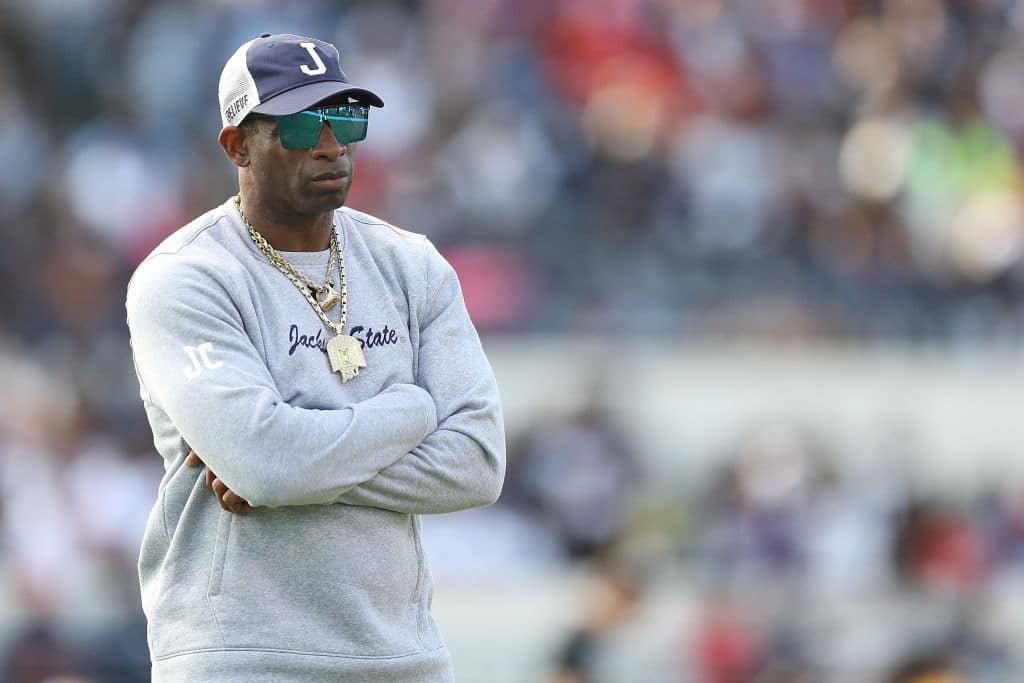
Hall of Famer Deion “Prime Time” Sanders is known for playing sports at the highest level throughout his football and baseball career. He’s carried that over as a coach to wining championships at Jackson State University and transforming the football program currently at Colorado. Yet, recently, Sanders has been away from the Colorado campus for nearly two months while recovering from an undisclosed medical issue. He had noticeably lost a lot of weight and the speculation is that the Pro Football Hall of Famer is once again dealing with blood clots, which led to physicians amputating two toes in 2022.
He revealed today that he was diagnosed with an aggressive form of bladder cancer.
“It was tough. It wasn’t a cakewalk. It wasn’t easy,” said Sanders, who arrived to his news conference wearing a cowboy hat and overalls along with sunglasses, which he took off after getting choked up. “That was a fight, but we made it.”
Sanders, who turns 58 next month, spoke on the eve of fall camp as he enters his third season overseeing the Buffaloes. He brought his medical team with him to discuss his diagnosis. A section of his intestine was reconstructed to function as a bladder. He won’t need any radiation or chemotherapy, said Dr. Janet Kukreja, the director of urologic oncology at the CU Cancer Center/UCHealth University of Colorado hospital.
Sanders said that he knew he had surgery upcoming for the tumor as his son Shedeur Sanders dealt with a rough draft weekend after he fell from a possible first-round NFL Draft pick to the fifth round.
“There was some scenes you saw, all the bull junk that’s transpired on draft day,” Sanders said. “It wasn’t just that. It was just, I knew as well I had a surgery coming up. My sons, to this day, don’t know what transpired, I just told them it was something with my foot, because I wanted to give them the focus on making the team and not focused on dad.”
The Pro Football Hall of Famer had been away from the team and at his home in Texas after spring practice to deal with health issues. He appeared at Big 12 media days earlier in July and declined to answer questions about his health while at the podium during his appearance there. He said Monday that not continuing to coach never crossed his mind after he was diagnosed.
Colorado assistant athletic trainer Lauren Askevold said that the cancer discovery began after Sanders went through his routine vascular tests. The training staff received a call from his primary care doctor after the vascular tests, and the process of setting up a visit with a urologist and diagnosing what was going on began.
Sanders detailed what he’s gone through since the surgery and said that he “can’t pee like I used to pee. It’s totally different.” He also said that he had lost 25 pounds at one point.
“I depend on Depend if you know what I mean,” Sanders said. “I cannot control my bladder. So I get up to go to the bathroom already 4-5 times a night. And I’m sitting there waking up like my grandson. We in the same thing. We got the same problem right now. We’re going through the same trials and tribulations.”
Bladder Cancer and Black Men: What Can We Do?
While bladder cancer is more common in White individuals than Black individuals in the United States, Black men are more likely to be diagnosed with later-stage disease and experience lower survival rates. This disparity highlights the need for further research into the underlying factors contributing to these differences, including genetic, lifestyle, and healthcare access issues.
Symptoms:
Bladder cancer symptoms in men may include:
Urinary Symptoms: Blood in the urine (hematuria), Frequent urination, Pain or burning during urination, Difficulty starting or stopping urination, and Weak or interrupted urine flow.
Other Symptoms:
Lower back pain, Pelvic pain, Erectile dysfunction, Fatigue, Weight loss, and Appetite loss.
It’s important to note that some men with bladder cancer may not experience any symptoms. It is important to see a doctor if you have any of these symptoms, especially if you are at risk for bladder cancer, such as being an older man or having a history of smoking.
Prevalence:
Bladder cancer is more prevalent in White individuals, but Black men face a higher risk of advanced stage diagnosis and mortality.
Survival Rates:
Black individuals with bladder cancer often experience lower survival rates compared to White individuals, even when accounting for stage and grade at diagnosis, according to a study on ScienceDirect.com.
Contributing Factors:
Several factors may contribute to these disparities, including socioeconomic status, healthcare access, genetic differences, and lifestyle factors like smoking.
Need for Further Research:
Understanding the specific reasons for these racial differences in bladder cancer outcomes is crucial for developing targeted interventions and improving care for Black men.
Bladder Cancer Risk Factors Black Men Need to Know
Smoking
Smoking is a major risk factor for bladder cancer. People who smoke are at least 3 times as likely to get bladder cancer as people who don’t. Smoking causes about half of all bladder cancers.
Workplace exposures
Certain industrial chemicals have been linked with bladder cancer.
- Chemicals called aromatic amines, such as benzidine and beta-naphthylamine, which are sometimes used in the dye industry, can cause bladder cancer. Workers in other industries that use certain organic chemicals also may have a higher risk of bladder cancer.
- Industries carrying higher risks include makers of rubber, leather, textiles, and paint products, as well as printing companies.
- Other workers with an increased risk of developing bladder cancer include painters, machinists, printers, firefighters, hairdressers (probably because of heavy exposure to hair dyes), and truck drivers (likely because of exposure to diesel fumes).
- Cigarette smoking and workplace exposures can act together to cause bladder cancer. So, people who smoke and also work with cancer-causing chemicals have an especially high risk of bladder cancer.
Certain medicines or herbal supplements
Did you know that certain medicines meant to help you can actually raise your risk for bladder cancer? Some research has suggested that the use of the diabetes medicine pioglitazone might be linked with an increased risk of bladder cancer. The risk seems to get higher when higher doses are used.
Dietary supplements containing aristolochic acid (mainly in herbs from the Aristolochia family) have been linked with an increased risk of urothelial cancers, including bladder cancer.
Not drinking enough fluids
People who drink a lot of fluids each day tend to have lower rates of bladder cancer. This might be because they empty their bladders more often, which could keep chemicals from lingering in their bladder.

What’s Next for Prime Time?
Even though dealing with this issue was hard, Prime has said he has full intentions of continuing to coach in Buffalo.
While he dealt with the cancer diagnosis, Sanders said he had plenty of friends and family members check in on him. Among those who reached out was Pro Football Hall of Fame wide receiver Randy Moss, who took a leave of absence from ESPN in early December after having surgery for cancer.
“Randy Moss called me every other day to make sure I was straight,” Sanders said. “Randy Moss prayed for me — he and his wife. Told me what I needed to be doing.”
Sanders stressed over and over the importance of early detection. His cancer was discovered when he went for an annual CT scan as a precaution given his history with blood clots.
“We’re lucky to have found it at this stage where I could say the word cure,” Kukreja said, “because I don’t use that word lightly as a cancer doctor.”








